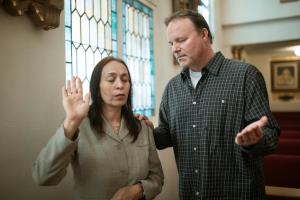
Introduction
We often hear that forgiveness is more for us than for the person who hurt us. It sounds good, but is it really true? Is it just a comforting idea, or does it have spiritual power? Can letting go of a deep offense actually lead to inner freedom? Can forgiving someone who never apologized or took responsibility actually bring healing and freedom to your soul? The answer is both complex and deeply spiritual. According to Scripture, the answer is a resounding yes—but not without challenge. Forgiveness matters!
The Weight of Unforgiveness
Unforgiveness is a heavy weight we carry in our hearts, often quietly. It may begin as a defense mechanism, but over time, it grows into a prison. It clutters the soul with bitterness, anger, and emotional fatigue.
Hebrews 12:15 warns, “See to it that no one falls short of the grace of God and that no bitter root grows up to cause trouble and defile many.” Unforgiveness plants a root of bitterness that spreads—and the person it hurts most is the one holding onto it.
What Forgiveness Is—And Isn’t
Forgiveness is one of the most misunderstood spiritual principles. And many people living dangerously because they don’t what it is and isn’t.

Here’s what it isn’t:
-
It’s not saying what happened was okay (Isaiah 5:20).
-
It’s not forgetting or pretending it didn’t hurt (Psalm 34:18).
-
It’s not always reconciliation—because that requires mutual agreement (Romans 12:18).
What it is, is this: a powerful act of faith. Forgiveness releases your right to revenge and entrusts justice to God. “Do not take revenge, my dear friends, but leave room for God’s wrath… ‘It is mine to avenge; I will repay,’ says the Lord”(Romans 12:19).
Forgiveness is not letting someone off the hook—it’s taking yourself off the hook and putting the matter in God’s hands.
Freedom Is a Soul Issue
Forgiveness is less about emotion and more about your spiritual posture. When you forgive, you open the gates of your soul and let peace in.
Jesus, in the ultimate act of mercy, said from the cross: “Father, forgive them, for they do not know what they are doing.” (Luke 23:34). He released forgiveness not because they asked, but because He lived from a higher perspective—one rooted in love and eternal purpose.
Paul echoed this in Ephesians 4:32: “Be kind and compassionate to one another, forgiving each other, just as in Christ God forgave you.”
Forgiveness is how we imitate the heart of God—and when we do, our souls experience the freedom that only grace can bring.
What If I Don’t Feel Free?
Sometimes you forgive with your mouth, but your heart still aches. That doesn’t mean it wasn’t real. Forgiveness is a process—a daily surrender. Jesus even said to forgive “seventy times seven” (Matthew 18:22), implying that it’s not a one-time transaction, but a lifestyle. Forgive as many times as required. You cannot place limitations on forgiveness.
When painful memories surface, don’t rehearse the wound—release it again. Say it out loud if you must: “I forgive. I release. I entrust this to God.”
Philippians 1:6 reminds us: “He who began a good work in you will carry it on to completion.” This includes healing your soul through the journey of forgiveness.
Does Forgiving Others Free Your Soul?
Absolutely—when you lean into God’s grace. Forgiveness is not a denial of your pain; it’s an act of spiritual defiance against the enemy’s plan to keep you stuck.
When you choose to forgive, you break the chains of offense, bitterness, and trauma. You allow your soul to breathe again.
Colossians 3:13 says, “Bear with each other and forgive one another… Forgive as the Lord forgave you.”
You may never get the apology. You may never hear the words you wish someone had said. But through forgiveness, you can walk in peace, live in power, and move forward in purpose.
Forgiveness may not change the past—but it will absolutely change your future.













